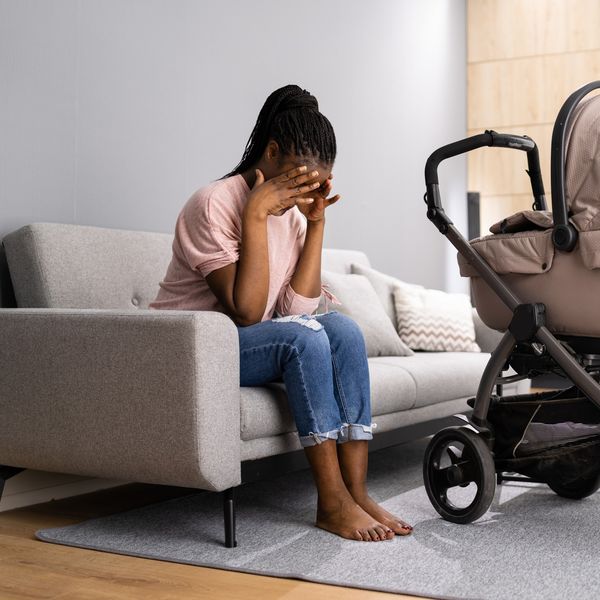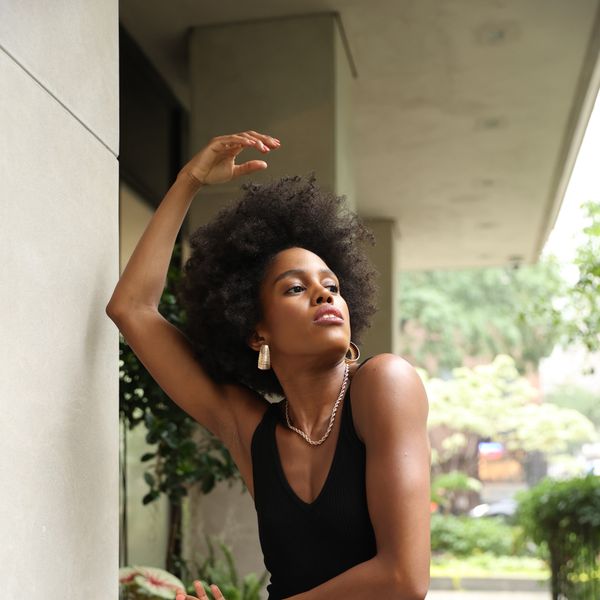
There’s an embarrassment of riches that comes with being a fan of ABC’s hit comedy Abbott Elementary. The show, which stars Quinta Brunson as Janine Teagues, Sheryl Lee Ralph as Barbara Howard, Tyler James Williams as Gregory Eddie, and Janelle James as Principal Ava Coleman, is about a group of mostly Black educators at a predominately Black elementary school in Philadelphia and has captured audiences for its tender, hilarious, and lighthearted depiction of what it's like to be a Black teacher to young Black students.
For many real-life Black educators watching the series, the show often reflects their real experiences dealing with the intersections of poverty and Blackness and all the other stuff that comes with teaching in America.
xoNecole reached out to several Black teachers to ask whether the beloved sitcom reflects what actually goes on in the classroom.
What are your thoughts on the show 'Abbott Elementary'?
Ms. Ora (1st Grade Teacher): I love Abbott Elementary! This is my first year as a teacher, but I worked in a D.C. middle school through City Year for the 2021-22 school year. There are a lot of little moments or little jokes that are made on the show that resonates with my experiences this year and last school year.
Mr. Wes (Middle School Teacher): I really enjoy the show, and you can really tell that they work closely with educators to make sure that they’re showing it in a truthful way. Even though it is a lighthearted show, some of the parts of it still trigger me in ways I don’t expect it to. Like the one teacher who’s teaching the combo 2nd and 3rd-grade class, the scenes of chaos in that class make me cringe like I’m watching a horror movie. I think Janine is also either an astonishingly talented teacher at her age or has the chillest second graders ever. I teach middle school, but from what I see/hear about from other teachers and my firsthand experience covering other classes, let’s just say I have a lot of questions (laughs).
What does the show get right about being a Black educator in a school located in a Black working-class neighborhood?
Ms. Ora: The students and the relationships the students have with the teachers are extremely accurate. It's hard to put into words what exactly is so distinct about it, but there is something different about how Black educators relate to their students who are Black (or of color) that the show is able to capture.
Ms. Destiny Stone-King (Middle School Teacher): It definitely highlights the joy of getting to relate to your students culturally and giving them that sense of security knowing that they have educators who look like them and have cultural similarities.
Which character do you most relate to?
Ms. Ora: I feel very much like a Janine. I'm new to education, I'm still learning, and sometimes I find myself wanting to fix more than I'm capable of fixing on my own. I also have my own Ms. Howard that I look up to at my school (who also happens to be a kindergarten teacher).
Mr. Wes: Definitely Gregory. I feel like I grew up in a strict, military household and I’ve learned how that type of instruction/behavior management does not always work and can sometimes even be counterproductive. I’ve learned how to let loose and embrace my ridiculous/fun side more and more. It took me a while to realize that the attitude and vibes I bring into the class affect how the students behave. Which seems obvious, but when you’re stressed out all the time because you didn’t have time to plan as much or you’re behind on grading, you’re not always thinking about how that affects your presence in the classroom. I see Gregory learning that, and that scene where he lets go and dances are one of my favorite moments in the whole show.
Anonymous (Pre-K & 4th Grade Teacher): This is a hard pick for me but I think I’m somewhere between Barbara and Janine. I have Barbara’s energy exactly where she and I are mostly calm and know what to expect from people, but I have a little bit of Janine’s optimism and desire to evoke change. Sometimes I think that Janine is doing too much and she does need to learn how to separate her identity from her job or else she’ll end up burnt out. But I’ve found a lot of older educators can be set in their way of doing things, like Barbara, and I don’t subscribe to that method either. If there is a problem, I like to explore solutions to the problem instead of accepting that some things just are the way that they are. So I want to change things within my power, but I’m not as unrealistic as Janine.
What made you want to get into education?
Johnny Greig/ Getty Images
Ms. Ora: Honestly, I'm not sure. I started my undergraduate degree with every intention of going into law or some form of international relations, but as I neared the end of my degree I found myself being interested in teaching ESL at some point in my life. Every time I thought about teaching, I got really excited--I loved the idea of teaching the fundamentals of language, which is what made me want to teach early elementary in particular.
Ms. Stone-King: It’s literally in my blood. My grandma, grandpa, and parents were all teachers. As an independent artist who is pursuing my career as a singer, songwriter, and recording artist, I like that I can mix my passion for music with education and still have time in the evenings and weekends to work on my craft. I also specifically wanted to teach in predominantly Black schools because I only had one music teacher who looked like me from elementary up to college, so I wanted to show students that they can do this too if they want.
Ms. Chelsea (Pre-K Teacher): My grandmother was a teacher. She was actually a principal for the school for the deaf and the blind in Jamaica. She was a big leader in being more welcoming and accepting of those with exceptionalities in Jamaica and even when she left, [she] carried on those values to raise me in the U.S. with my mom. She was also my Pre-K teacher when I was little which was fun. I also am an only child and always loved taking care of kids and playing with kids. When I was in high school, my neighbor’s kids would knock on my door after school for me to play with them and my mom would be like, “You know she’s 16, right?” but we all didn't care. I loved spending time with them! So I decided to go into education because I just felt happy when I was working with kids and watching them grow and learn something new.
What’s something you hope the show touches on?
Ms. Stone-King: I hope the show has an episode about the arts!
Mr. Wes: I really hope they get into teacher unions. I’m very pro-labor and pro-union, but many of these establishment unions in large cities have become closer to school districts than a united labor force; bureaucracy, power trips, and just general apathy are what I feel like I get sometimes from my union. At a higher level, there’s obviously the tension between districts and unions, but I think the real intrigue is going deeper into what actually goes on in teacher unions. If a teacher has a serious issue, how are they helping address it? Many unions do great work but I feel that others need to take a serious look in the mirror and assess how they are actually helping the educators that they represent.
Ms. Kaitlin (4th Grade Teacher): I understand Ava blackmailed her way into the principal role, but let’s talk about how Gregory, who I adore, anticipated becoming principal without ever having taught. Ava drives those teachers crazy, but what would drive a teacher even crazier is being led by someone who has never set foot in a classroom. Let’s bring that back up, please! I want to know why Gregory thought principal-ing was something in his near future.
What would you like fans of 'Abbott Elementary' to know about the realities of working as a Black educator that they might not glean from the show?
Ms. Stone-King: Teaching is already an emotional investment, but especially being a Black educator working with Black students, you feel a greater responsibility to protect them but also expose them to possibilities that they’ve been conditioned to stay away from because of the color of their skin.
Anonymous: People will expect you to volunteer your time because we work in a caring profession, and then they’ll make you feel bad for asking about pay. This means that they’ll expect you to work during your lunch, come in after school, stay after school, and work late nights for free and not even suggest payment for these services. For teachers especially, if you take the day off you have to leave lesson plans for the person covering your classroom. They will likely call you on your off day and think you’re in the wrong for not answering the phone (if you don’t).
People know exactly what children need to learn and yet you’ll still need to advocate for your children especially to receive those support. Smaller class sizes, flexible seating, and empirically-based curriculum/technology do not come cheap or easily. The episode where they had additional money in the budget and Janine wanted a computer for the students so they could have a comparable experience to the charter was very real, and then for that money to get snatched up to address the rat infestation was even more tragically accurate.
Some things in the show seem too terrible to be true. I want fans to know that they are based in reality.
What are ways for the public to support Black educators and their students?
Anonymous: Please fund your schools, and vote for people who will fund the schools adequately. The money is plentiful and the real issue is that they are using it for reactive services versus proactive (education). Be involved in your local school district (volunteer, show up to after-school functions, and be an active member of the school boards). I mean this, especially for Black people and people who are invested in issues that impact Black people. The best way to support Black educators and our students is to show up.
As I said earlier, everyone relies on schools for a number of resources: dental and vision exams, therapy (occupational, physical, and emotional), parenting support, and more. Doctors will write prescriptions to parents to bring their child to school for evaluations, versus using outside agencies/referrals to evaluate children due to financial restraints. This is the foundation of our society for many families and it needs money and support in order to help our neighborhood grow.
Ms. Kaitlin: To voice Janine, the best way to support Black educators is by building community with them. The first Black working-class school I had taught in was in Bowie, MD, and we thrived from a beautiful balance of parent, teacher, and faculty involvement. Parents regularly helped with school lunches and special event days, teachers collaborated often, and faculty gave us helpful feedback and resources. It was an idyllic school setting, and the students absolutely thrived there. Another way to support a Black educator is by giving them money.
Ms. Rhyanna Morgan (2nd Grade Teacher): VOLUNTEER!!! Many public schools are short staffed and we need people that look like us helping us. Students need to see adults pitching in to take care of schools and the people in them. Make your voices heard, know what is going on at your neighborhood school, keep tabs on the school boards of Black and Brown cities. These things keep the community involved and keep schools safe and keep children with the education they deserve.
What advice do you give to any Black person who might be inspired to become an educator because of 'Abbott Elementary'?
Anonymous: I would advise anyone inspired to become an educator because of Abbott Elementary to go work/volunteer in a public school so they can learn the profession before committing to it. Abbott isn’t lying about how much is required of teachers. Teachers aren’t just teaching math, but they are also teaching about social skills, managing emotions, and now they’re taking temperatures. I would also advise anyone who wants to work in education to spend some time working with children with disabilities at specialty schools and settings. I want anyone aspiring to be an educator to familiarize themselves with special education and the research pertaining to how it impacts Black and brown children differently than it does white children.
Ms. Kaitlin: Care for your Black students as the teachers of Abbott Elementary care for theirs. In predominantly Black working-class schools, often educators and faculty police their students instead of care for them. The reasons are many-fold, but I hope that they are unlearned swiftly. I radically (at least it felt radical in my D.C. school), refused to raise my voice at my students. I had come out of an abusive relationship and learned that yelling was not a natural form of communication. This was something I had translated to my co-teacher, but she was not on board with the practice, so much so that she, a fellow Black educator, claimed that these students were “from the gutter,” and thus deserved to be spoken that way. They were nine. I don’t know how you look at a nine-year-old child and see them that way, or speak to them with such animosity. The way the teachers of Abbott Elementary speak to and care for their students should be replicated in schools everywhere.
Ms. Chelsea: Do your research on the schools you want to work at, ask to come in and observe. See how you feel in the space. Don’t be quick to run from the job. (I say many times a day I’m going to quit but I’m not serious, haha, I love what I do even when it's hard.) Reach out to me if you want to observe or see what different classrooms look like. I’m happy to share. I’m big on diverse children’s literature and can share my recommendations, etc.
Let’s make things inbox official! Sign up for the xoNecole newsletter for daily love, wellness, career, and exclusive content delivered straight to your inbox.
Feature image by Klaus Vedfelt/ Getty Images
- How Valencia Clay Is Redefining What It Means To Be An Educator ›
- Black Women On How They Found The Therapist That Was ‘The One’ ›
- 8 HBCU Alums On How School Shaped Their Lives ›
- 'Abbott Elementary' Proves That TV Can Build Community ›
- To Be Young, Gifted & Black: 5 Black Educators On The Power Of Representation In The Classroom ›
This Is How To Keep 'Holiday Season Stress' From Infecting Your Relationship
Hmph. Maybe it’s just me, but it seems like there is something really weird happening in the fall season air (because winter doesn’t officially begin until December 21) that cuddle season is in full swing while break-up season is as well. In fact, did you know that break-ups are so popular during the holiday season that December 11 is deemed Break-Up Day?
The reasons why relationships shift around this time vary; however, I did both roll my eyes and chuckle when I read that a very popular one is because it’s an easy way to get out of getting one’s significant other a Christmas present. SMDH.
Anyway, I personally think that the less shallow folks out here may contemplate calling things “quits” or they at least distance themselves a bit from their partner (and what I’m referring to is serious relationships) due to all of the stress and strain that oftentimes comes with the holidays whether it be financial, familial, due to their tight schedules or something else.
Listen, I would hate for you and your man to miss the fun and happiness of experiencing this time of year, all because you are so overwhelmed or irritated that you can’t really enjoy it. That’s why I have a few practical tips for how to avoid allowing the typical holiday season stress from INFECTING your relationship.
Manage Your Expectations
 Giphy
GiphyUnmanaged expectations. If there is a main reason why the holiday season tends to be so stress-filled for so many people, I’d bet good money that this is the cause. And when you’re in a long-term relationship, expectations can manifest themselves in all sorts of cryptic and/or unexpected ways. You might have relatives who assume that you are going to be with them for Thanksgiving or Christmas when you have other plans in mind. You might be thinking that you are going to spend one amount for presents while your man is thinking something totally different. When it comes to scheduling, your signals may be crossed.
And you know what? To all of these scenarios, this is where clear and consistent communication come in. Don’t assume anything. Don’t dictate anything either. From now until New Year’s, mutually decide to check in once a week, just to make sure that you are both on the same page as it relates to the holidays and what you both are thinking will come along with it. The less blindsided you both feel, the less stressed out you will be. Trust me on this.
Set (and Keep) a Budget
 Giphy
GiphyOkay, so I read that last year, 36 percent of Americans incurred some type of holiday-related debt. Hmph. Last year, there was still some sense of normalcy in this country, chile, so I can only imagine what finances are gonna look like over the next several weeks. That said, since I don’t know a lot of people who don’t find being broke stressful, make sure that you and your bae set a budget and then stick to it this year — no ifs, ands or buts.
Because really, y’all — it doesn’t make sense to deplete savings and/or max out credit cards for a few days of giggles only to be damn near losing your mind because you don’t know how to make ends meet come Dr. Martin Luther King, Jr. Day.
And by the way, this tip doesn’t just speak to things like food and gifts; I also mean travel. If it doesn’t make a ton of sense (or cents) to be all over the place this year — DON’T BE.
Keep Matthew 5:37 at the Forefront
 Giphy
GiphyIf off the top of your head, you don’t know what Matthew 5:37 says, no worries, here ya go: “But let your ‘Yes’ be ‘Yes,’ and your ‘No,’ ‘No.’ For whatever is more than these is from the evil one.” That verse right there? Oh, it’s a boundaries lifesaver! I say that because do you see “maybe” or “I’ll think about it” in there? Nope. LOL. It says that you should tell people “yes” or “no” and leave it at that — and that complements Anne Lamott’s quote, “’No’ is a complete sentence” impeccably well. Yeah, you’ve got to remember that anything beyond a yes or no to a request is privileged information; you don’t owe anyone details or an explanation.
Besides, if you are really honest with yourself, when someone asks you something and you give a “Umm, let me think about it” kind of reply, more times than not, you already know what your answer is going to be — so why not let you both off of the hook? Give your response. Commit to that. And let everyone (including yourself) get on with their lives and schedules.
I promise you that when it comes to those holiday parties, you are pissing more folks off by not RSVP’ing or doing so and not showing up than just saying, “Thank you but not this year” off the rip.
Remember That Your Personal Space Is Privilege Not a Right
 Giphy
GiphyA friend of mine recently bought a new house and invited me over to come see it. He’s a single man with no children, so as I was taking in all of the space that he had, especially as I walked through his finished basement, I joked about relatives coming to live with him. “Hell no” and “absolutely not” were pretty much his immediate responses as he went on to say that some folks even had the nerve to be offended when he told them that he had no intentions on taking DNA in.
Ain’t it wild how people think that your stuff is their right? And yes, that brings me to my next point. Your home is your sanctuary space. If you want to host folks this year — cool. If not, ALSO COOL. Please don’t let folks (family included) guilt you into how they want you to act or even into what they would do if the shoe was on the other foot. You are not them — and as one of my favorite quotes states, “If two people were exactly alike, one of them would be unnecessary.” (A man by the name Larry Dixon said that.)
Hell, my friends? They know that I am good for sending them random things that they need or even want all throughout the year. Coming over to hang out at my pace, though. Uh-uh. Chalk it up to being a card-carrying member of the ambivert club yet I like keeping my living space personal — and I sleep like a baby, each and every night, for feeling that way.
Always remember that your space, your time, your resources, your energy and shoot, yourself period (including your relationship), are all things that are your own. You get to choose how, when and why you want to share them. The holiday season is certainly no exception.
Cultivate Some “You Two Only” Traditions
 Giphy
GiphyIt’s not uncommon for some couples to hit me up after the holiday season to “detox.” Sometimes it’s due to the financial drama (and sometimes trauma) that they experienced. Sometimes it’s because they allowed their relatives (especially in-laws) to get more into their personal business than they should’ve. More than anything, though, it tends to be because they didn’t get enough quality time together and so ended up feeling “disconnected.”
Please don’t let that happen. Listen, I’m not even a holidays kind of woman and yet, I will absolutely sit myself down with some hot chocolate and chocolate chip cookies to enjoy a Hallmark holiday film or two. Aside from the fact that most of them are lighthearted and sweet, I also like that they usually focus on couples loving on each other amidst all of the holiday beauty and ambiance — which is something that all couples should set aside some time to do.
Maybe it’s a vacation. Maybe it’s a staycation. Or maybe it’s my personal favorite, A SEXCATION. Whether it’s for a few days, the weekend or even overnight — don’t you let the holidays go by without setting aside time for you and your man to celebrate one another. Don’t you dare (check out “Are You Ready To Have Some Very Merry 'Christmas Sex'?”).
GET. SOME. REST.
 Giphy
GiphyI once read that 8 out of 10 people get stressed out over the holidays and 3 out of 10 lose sleep during to it — and when you’re stress-filled and sleep-deprived, that can absolutely lead to hypersensitivity, making mountains out of molehills and even not being in the mood for sex.
Your relationship can’t afford to go through any of this, so definitely make sure to prioritize rest. I don’t care how unrealistic it might seem during this time, sleep should never be seen as a luxury; it will always and forever be a great necessity.
That said, try to get no less than six hours of shut-eye in (check out “6 Fascinating Ways Sex And Sleep Definitely Go Hand In Hand”) and even ask your bae to take a nap with you sometimes (check out “Wanna Have Some Next-Level Sex? Take A Nap, Sis.”). Not only will sleep help to restore your mind, body and spirit but, when it’s with your partner, it’s an act of intimacy that can make you both feel super connected, even in the midst of what might feel like chaos.
___
Holiday season stress is real. Still, never give it the permission or power to throw your relationship off. Put you and your man first and let the holidays be what they are gonna be, chile.
Let’s make things inbox official! Sign up for the xoNecole newsletter for love, wellness, career, and exclusive content delivered straight to your inbox.
Featured image by Shutterstock
While doing a podcast interview a couple of weeks ago, when I said my age, the interviewer complimented me by saying that what I said is not what they would’ve guessed. When they asked what the secret was, the first thing that came out of my mouth was, “Oh, I’m gonna take me a nap.”
I adore sleep. I’ve said before that it’s like what Six Flags is to some people. And really, it’s just a plus that there are so many health benefits from getting plenty of rest. Beauty-wise, science does reveal that getting no less than seven hours a night can slow down signs of aging. Know what else? There are some direct things that sleep — and the lack thereof — can do to your immunity as well.
And so, since this is the time of year when catching a cold (and/or the flu) is common, let’s talk about the impact that sleep (and again, a lack thereof) has on your immune system. That way, you can remain as healthy as possible during the fall and winter seasons.
1. Less Sleep Means More Colds
 Giphy
GiphyLike I stated in the intro, I’m pretty sure you’ve heard somewhere that the fall and winter are the seasons when people are most susceptible to catching a cold or coming down with the flu. And that’s exactly why I thought I would start this all off by sharing the fact that some studies reveal that if you get less than six hours of sleep, on a consistent basis, you end up making yourself more vulnerable to coming down with both. In fact, some research says that only 18 percent of people who get six-plus hours of rest caught a cold while almost 40 percent who got less than that did.
The logic behind it all is sleep gives your body time to build up the proteins and cells (like cytokines and T-cells) that you need to fight off certain viruses. So, if nothing bothers you more than having a stuffy nose or stubborn cough when it’s cold outside, getting more sleep is one way to prevent that from happening to you.
2. Less Sleep Means More Allergy Symptoms
 Giphy
GiphyAt the end of the day, an allergy is basically what transpires whenever your immune system “overreacts” to something that other people’s systems do not. And since sleep is what helps to keep your immune system nice and strong — well, I’m sure you get how less allergy-related symptoms and more sleep go hand in hand. Also, since sleep helps to decrease bodily inflammation (more on that in a bit) and inflammation can also intensify allergy symptoms, that’s just one more reason to get as much shut-eye as possible.
3. Less Sleep Means Potential Diabetes and Heart Disease
 Giphy
GiphyDid you know that in 2024, Black women were diagnosed with diabetes 24 percent more than any other adult demographic. Also, it continues to be a reality that heart disease is the leading cause of death for Black women. These two sobering statistics alone should be enough of an incentive to do whatever you can to keep the risk of diabetes and heart disease way down.
One way to do that is by getting more sleep. Aside from the fact that sleep strengthens your immune system to where it is easier for you to fight off illness and diseases, sleep can keep your blood sugar levels in a healthy space; plus, when it comes to your heart, it gives it, along with your arteries and blood vessels a break.
4. Less Sleep Means Less Time for Your Body to Push “Reset”
 Giphy
GiphyIf you really stopped to consider all that your body goes through during the day (you can read some about that here), you definitely would respect it enough to do your best to thank it by giving it no less than six hours of sleep, each and every night. Sleep is what helps to slow your brain and body down so they are able to “refuel” for the next day. After all, how can your body prevent you from getting sick if your immune system is too worn out to fight ailments off? Exactly.
5. More Sleep Helps You to Fight Off Infections
 Giphy
GiphySpeaking of, in order for your body to fight off infections, there are certain cells and antibodies within you that need to be healthy and strong — one way that they get and stay that way is by you getting a good amount of sleep. For instance, remember when I touched on cytokines earlier? Well, the same way that they help to prevent colds, they also help to prevent infections too. And since sleep lowers your cortisol (stress) levels, rest gives your body the time and space to build up an army that can fight off free radicals and other health-related challenges while you are awake.
6. More Sleep Lowers Bodily Inflammation
 Giphy
GiphyWhenever a health-related issue is mentioned on this platform, inflammation is something that is mentioned quite a bit. Probably the easiest way to explain inflammation is it’s how your body responds/reacts whenever something is happening to your body that shouldn’t be, whether it’s an illness, an injury, a germ or something that you may be allergic to.
If you happen to have chronic inflammation, some symptoms that are associated with that include fatigue, stiff joints, skin rashes, weight gain and moodiness.
The interesting thing about all of this is if you aren’t getting enough rest, you could be triggering inflammation in your body. That’s because studies reveal that a lack of sleep can elevate molecules that are associated with inflammation. So, if you don’t want inflammation to increase within your system, you should definitely catch more zzz’s.
7. More Sleep Regulates Hormones
 Giphy
GiphyWhen it comes to hormones like serotonin, estrogen and cortisol, believe it or not, they play a role in how your immune system acts and overreacts. That’s because, if your hormones are out of balance, that can cause your immune system to work harder than it actually should and that can make you more vulnerable to sickness. One way to keep your hormones leveled out? SLEEP.
That’s because sleep gives your body the opportunity to rest, repair and restore your hormone levels. On the other hand, when you are sleep deprived, that can put/keep your hormones on the ultimate roller coaster ride. #notgood
8. More Sleep Strengthens Vaccines
 flu shot GIF - Find & Share on GIPHYGiphy
flu shot GIF - Find & Share on GIPHYGiphyIf you’re someone who is good for getting some sort of vaccine around this time of the year, make sure that you rest up before and after getting your shots. Not only does adequate rest before a vaccination help your immune system to be better receptive to your shots but sleep also helps your body to build up enough antibodies to make your vaccinations effective after getting them. Because if you’re gonna get pricked, shouldn’t it be worth it? My thoughts exactly.
Get some freakin’ sleep! Your immune system depends on it.
Let’s make things inbox official! Sign up for the xoNecole newsletter for love, wellness, career, and exclusive content delivered straight to your inbox.
Featured image by Shutterstock



